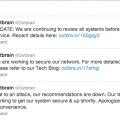 By MARY PATRICK
By MARY PATRICK
In yet another case that shows the growing need for cyber experts, two men have been charged with stealing source code from a New York firm in an attempt to use the technology to start their own business.
The two men were changed by New York prosecutors for taking trading strategies, valuation algorithms
and proprietary code from the Manhattan firm Flow Traders LLC.
The two men charged were Jason Vuu, a former trader at Flow Trader, who was accused of sharing the
code with another man, Simon Lu. Another former trader, Glen Cressman, was charged with making
copies of trading strategies and valuations, according to Reuters.
The charges show again the importance of security in computer networks. While not typical cyber
security issues, the ability to go into a computer system and copy code highlights the need for
better cyber security efforts across all industries. That is one of the reasons so many universities now offer cyber security degrees and certifications.
The Flow Traders case comes a year after a Goldman Sachs employee was accused of stealing secret
trading code from the company.
Manhattan District Attorney Cyrus Vance and the U.S. District Attorney for Manhattan Preet Bharara
have made going after cyber criminals and attacking corporate espionage a top priority in the nation’s
largest city.
According to Reuters, Vuu sent copies of company files from his work email account to his personal
email address 10 times between August 2011 and August 2012. He also shared source code with Lu via
Dropbox after Lu suggested they use the code to start their own firm, according to the complaint as
quoted by Reuters.
None of the three men currently live in New York City. Vuu is in Pittsburgh, Lu is in California and
Cressman is in Fort Lauderdale, Fla.
The case also shows the value of business ethics, something that is taught by many universities.
Copying and transmitting files is low-tech when compared to the cyber crimes that are now taking place
worldwide. A recent Wall Street Journal report, for example, said the country of Saudi Arabia has teamed with Western information technology experts to improve cyber security at state-run oil company Aramco.
The decision to improve security came after an attack on the oil company. Middle Eastern cyber security
experts told the Wall Street Journal that Saudi Arabia – which had a reputation for lax online
security measures and plenty of political enemies – is the second-biggest target in the world for online
spamming.
The Aramco attack was successful, with 85% of the company’s devices impaired by the attack, according
to Aramco. Hackers also have successful hacked Google searches to put up messages to Saudi King
Abdullah. For example, “Hey King of Saudi Arabia, Please Don’t Support to Terrorist Military of Egypt” is what you read if you searched on Google for King Abdullah earlier this month.





